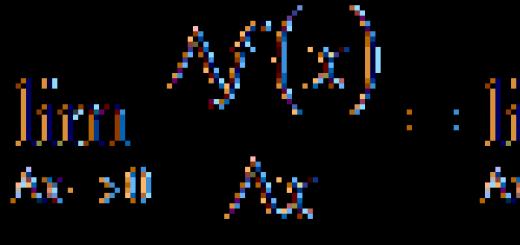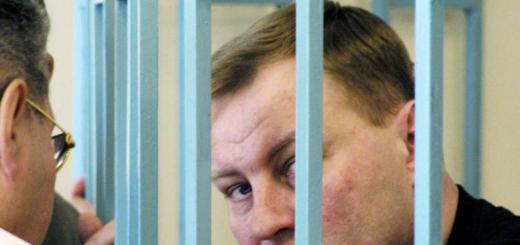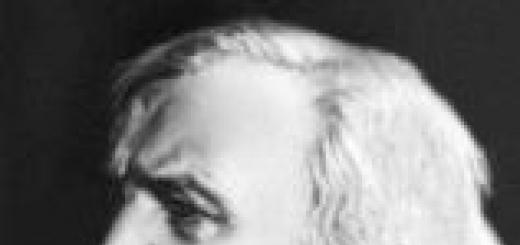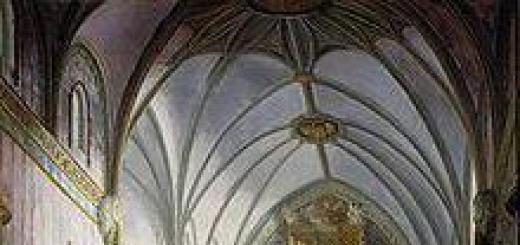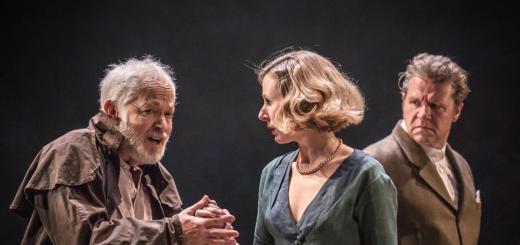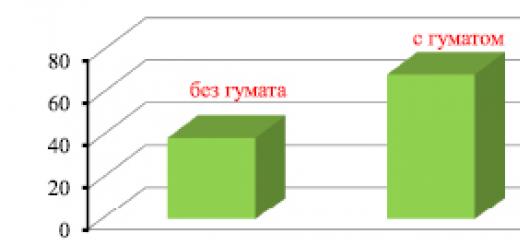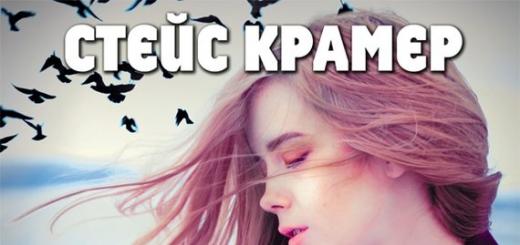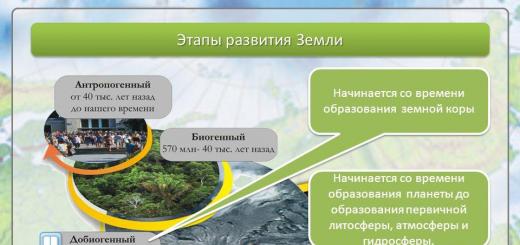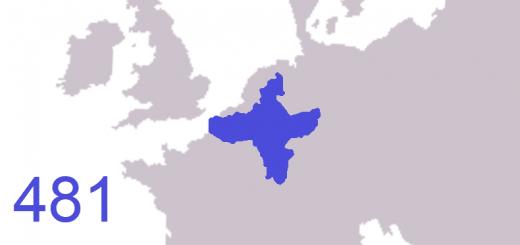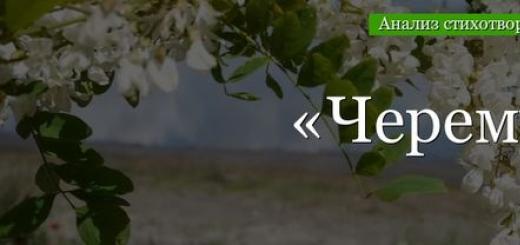Christian literature began with the Holy Scriptures, consisting of the Old and New Testaments. Based on these books, interpretations and theological works appeared. As Christianity spread, ascetics appeared who left behind patristic heritage and instructions. Their lives and exploits are described in the books of the lives of the saints. And Orthodox fiction has appeared relatively recently.
All this variety of books is usually called Orthodox literature. Let's consider the main directions in more detail.
Depending on the complexity of understanding, the books are divided into three groups:
Basics (ABOUT)- easy-to-understand books written in simple language
Horizon (G)- books that may be difficult to understand
Vertex (IN)- books that are extremely difficult to comprehend without proper preparation
Holy Bible
The central place on the bookshelf of an Orthodox Christian should be occupied by the Holy Scriptures.
Venerable Theodore the Studite:
« It is a great evil not to know the Scriptures, for countless evils are born from ignorance of the Scriptures... »
The study of Orthodoxy must first begin with reading And .
The New Testament is both a simple and incredibly difficult book to understand. Despite the fact that the Word of God was originally addressed to carpenters, fishermen, shepherds - ordinary people, with each reading of the Gospel a person discovers something new, unknown. Therefore, divinely inspired texts should be read with special diligence and care.
Bible Interpretation
To understand the Bible, it is necessary to resort to interpretations - explanations of the tests of the New and Old Testaments. Among patristic interpretations, complex, lengthy ones occupy a special place. (G), which for many centuries have been a guiding light in the study of the New Testament.
Saint Theophan the Recluse:
Many Christians have come to love relatively simple (ABOUT), and " " (ABOUT) St. Basil of Kineshma, written in a profound and modern language.
The following explanations of Scripture have also received good reviews: " " (ABOUT) biblical scholar Boris Gladkov, " " (ABOUT) " " (ABOUT) Alexandra Lopukhina, " " (ABOUT) Archpriest Oleg Stenyaev, " " (ABOUT).
God's law
The Law of God and the Catechism (a manual containing the main provisions of Christian doctrine) will help the beginner to comprehend the basics of Orthodox doctrine, become familiar with the brief history of the New and Old Testaments, understand what prayer is, learn about the structure of the Church and the temple, the meaning of worship.
Probably the most famous book in this series is " " (ABOUT) Archpriest Seraphim Slobodsky. Much about the life of the Church can be gleaned from books such as " " (ABOUT) Archimandrite Job (Gumerov), " " (ABOUT) priest Daniil Sysoev, " " (ABOUT) Metropolitan Hilarion (Alfeev), " " (ABOUT) Saint Philaret (Drozdov).
Instructions on Spiritual Life
Among the instructions I would like to highlight " " (ABOUT) Archimandrite John (Krestyankin). In this book, the elder invites the repentant person to build a confession according to the Ten Commandments or the Beatitudes. The path of confession helps to overcome the deep advice and apt comments of Father John, so necessary for every Christian. The elder’s experience, love, pain and kindness are felt in every word.
Such books as " " (ABOUT) Archpriest Andrei Tkachev, " " (ABOUT) Archimandrite Andrey (Konanos), " " (ABOUT) Metropolitan Anthony of Sourozh (Bloom), " " (ABOUT) Abbot Nikon (Vorobyov).
Creations of the Holy Fathers
The famous preacher Alexey Ilyich Osipov recommends that you familiarize yourself with the works of the saint (G) and letters from the abbot (G). Saint Ignatius, in his opinion, is notable for translating the ancient patristic teaching into modern language.
Saint Ignatius himself advises: “A Christian, whose lot is to live and end his life among the world, should read the Holy Fathers, who wrote for all Christians in general. These are the writers whose works were written in Russian or translated into it: St. John Chrysostom, St. Demetrius of Rostov, St. Tikhon of Voronezh, Nicephorus of Astrakhan, St. George the Recluse.” The saint does not recommend that laity read the holy fathers who wrote for monastics, saying that “There can be no benefit, but there may be harm...”
Deserves special attention " " (ABOUT) Abba Dorotheus. This book is recommended to be read by many modern priests and ancient saints.
It will also be useful, to the extent possible, to familiarize yourself with the works of Theophan the Recluse, Tikhon of Zadonsk and other Church Fathers.
Lives of the Saints
Many will be strengthened in the faith by the lives of people - descriptions of the lives and deeds of saints, whose perseverance and wisdom are a good example for a modern Christian.
Saint Tikhon of Zadonsk:
« A reliable means for maintaining faith and love is reading the holy fathers and the lives of saints... »
It will be useful to familiarize yourself with the lives of Xenia of St. Petersburg, Seraphim of Sarov, Sergius of Radonezh, Nicholas the Wonderworker and others.
Orthodox prose
Fiction is probably the most voluminous area of Orthodox literature, which is worth talking about separately.
Protodeacon Andrey Kuraev advises beginners to read the story by Nikiforov-Volgin " " (ABOUT), written on behalf of an Orthodox priest. The series is extremely popular " " (ABOUT) Archpriest Alexander Torik.
Novels can also help you understand Orthodoxy (G), (ABOUT), stories (ABOUT), (ABOUT), (ABOUT), stories (ABOUT), (ABOUT).
Lately, a lot of good children's literature has appeared - fairy tales (Dmitry Dmitriev, Irina Glazunova), parables (Olga Klyukina), stories and tales (Boris Ganago, Larisa Kalyuzhnaya, the “Grains” series, etc.), unobtrusively and fascinatingly telling about the Lord, his teaching and the godly life of a Christian.
Of the foreign authors, I would like to especially note the creativity, which includes both works for children (the Chronicles of Narnia series) and for adult audiences (“Letters from Screwtape” (O), “Balamut proposes a toast” (O)).
True stories are a special trend in fiction. The most famous collection of true stories - " " (ABOUT) Father Tikhon (Shevkunov) and followed the book of the Sretensky Monastery.
Theology
The following books will be suitable for the most prepared people for a deep comprehension of Orthodoxy: " " (G) Metropolitan Hilarion (Alfeev), " " (IN), " " (IN) Protopresbyter Alexander Schmemann, " " (G) Venerable John of Damascus, " " (G) Archpriest Vladislav Sveshnikov, "" (ABOUT) Holy Righteous John of Kronstadt, " " (ABOUT) Archpriest Ioann Goncharov, " " (ABOUT) Archbishop Nikon (Rozhdestvensky).
All publications intended for the church book trade are subject to mandatory review by the Publishing Council of the Russian Orthodox Church and are assigned a special stamp. In other words, a book without a stamp cannot be sold in a church shop. This was done so that the Church had “confidence that any book purchased in a church shop or a temple candle shop will be useful to the reader and will serve his spiritual development.”
Venerable Anthony of Optina:
« I earnestly ask you, as a sincere friend, not to fill your heads with your own waste and nonsense, but to use your memory to read books, the most spiritual and edifying... »
With the blessing of His Holiness Patriarch Kirill of Moscow and All Rus'
Books marked “By the blessing of...” are considered to be of the highest quality.
The stamp is assigned to the Holy Scriptures, liturgical literature, collections of canonical rules and regulations of the Church, official church documents adopted by the Bishops' and Local Councils, as well as the Holy Synod.
The stamp is intended for the rest (not covered by the first stamp) of Orthodox literature - books on the history of the Church, lives of saints, etc.
Approved for distribution by the Publishing Council of the Russian Orthodox Church
Books marked “Accepted...” do not contradict Orthodox teaching, but they are not necessarily beneficial either.
The stamp can be assigned to works of fiction that lead the reader to the truths of Christian morality, but do not carry a strictly religious theme; publications covering Orthodox customs and ritual traditions; collections of culinary recipes for fasting and holidays.
Approved for distribution by the Publishing Council of the Russian Orthodox Church on the basis of the conclusion of the Synodal Department of Religious Education and Catechesis
The stamp was introduced to speed up the publication of books. Responsibility for their content lies with the Synodal Department of Religious Education and Catechesis.
In addition to books, the Publishing Council stamp is placed on audio and video products.
The Ukrainian and Belarusian Orthodox Churches, as well as the Orthodox Church of Moldova, have their own vultures. Books with such stamps can also be sold in the church shop at the temple.
Of the three notebooks of the Diary of Novice Nikolai Mitrofanovich Belyaev (1888–1931) (later Hieromonk Nikon, the last confessor of the Optina Monastery before its closure in 1927, confessor; canonized in the host of the Reverend Elders of Optina by the Bishops' Council of the Russian Orthodox Church in 1996), only one from which several initial pages have been lost. But even on the basis of the surviving text, it is possible to form a fairly complete picture about the spiritual quest of the future elder, about his first steps in the ascetic life, about his relationship with his spiritual mentor, which is exceptional for our time. Two bright images vividly appear before the reader - the head of the Optina monastery, the confessor of the monastery, an elder both in spiritual and physical age, Venerable. Barsanuphius and, on the other hand, a twenty-year-old youth, a seeker of Truth, who decided to take the path of not only rational, but active knowledge of It. The diary reflections of the novice Nicholas himself and, even more so, the instructions of Elder Barsanuphius recorded by him represent one of the last valuable pages of the two thousand-year-old spiritual tradition of the Orthodox Church - the tradition of struggling with passions, making commandments, prayer...
But any diary is always a personal, more or less subjective document. This is an almost daily series of all - not only bright, but also negative experiences, all - not only true, but also erroneous judgments and thoughts. In addition, the author of the diary, even if we are talking about a holy ascetic, writes, as a rule, only for himself, hardly thinking about how what he wrote can be understood and perceived by another person. In addition, a diary is also a collection of small details (facts, observations, comments), which, although perhaps important milestones in the fate of this particular person, can hardly be of significant significance for people living in other conditions, in another era.
Therefore, when preparing this publication for publication, we did not consider it necessary to publish the full author's text. The following were omitted from the original: firstly, minor (everyday, biographical, etc.) details that would have increased the volume of an already considerable book and therefore would have made it less accessible to a wide range of readers; secondly, facts, observations, thoughts that are of a purely personal nature (complicated relationships with brother Ivan, negative assessments given to specific individuals, examples of fatherly love and care of Elder Barsanuphius towards the author, etc.) - publish them , in our opinion, is simply indelicate; thirdly, some judgments by Rev. Barsanuphius, which, reflecting the individual traits of his own spiritual and life make-up, are not entirely consistent with the experience of the majority of Orthodox saints, and therefore could, in our opinion, become a “stumbling block” for many readers; finally, those places in which the author’s thought is not expressed clearly enough and therefore can be distorted and reinterpreted.
At the same time, it should be especially emphasized that when preparing the Diary for publication and editing it, we were guided solely by considerations of spiritual and moral expediency, and not by “censorship” concerns. Unlike the editors of the book “The Diary of the Last Confessor of the Optina Hermitage” (St. Petersburg, 1994), which is precisely an example of strict and very tendentious censorship, we have preserved in our publication all (apparently, those that seemed too “edgy”) passages from the “Diary” ", which touch upon complex issues of Russian history (for example, the so-called Jewish question), and pressing problems of church life (the decline of monasticism, the lack of genuine spiritual leadership, the disastrous state of spiritual education, the corruption of morals in Russian society and the people as a whole, etc. .).
We hope that this publication will be interesting and, most importantly, useful not only to everyone already walking along the path of spiritual life, but also to everyone looking for this path, to everyone preparing to follow it.
Orthodox literature is not necessarily boring moralizing teachings on how to live. We present to the reader five most interesting modern Orthodox books about faith and unbelief, the monastery and the world, life and death, righteousness and sinfulness, love and hatred, and much more.
"Unholy Saints"
If you have not yet read this book, then in a certain sense you can even be congratulated. 640 pages of exciting reading await you. The collection of stories by Tikhon Shevkunov is, undoubtedly, not only a modern Orthodox bestseller, but also an all-Russian one.
The first edition appeared in 2011, and by the beginning of 2016 its total circulation had already reached over two million copies. During this time, the bestseller was translated into 13 foreign languages.

What is this Orthodox book about, which in just a few years has gained such popularity not only among Russian readers? The stories of Bishop Tikhon Shevkunov are a book about the main thing. About God and man, about faith and repentance, about humanity and working on oneself, about monastic life without cuts and decorations, about the modern life of the Church and Soviet tests of faith.
Before Tikhon Shevkunov, virtually no other author depicted monastic everyday life so truthfully and in detail. Each story is read in one breath, written easily and accessible even to a person far from the Church. There is no moralizing and pharisaism, boring teachings and boring stories in it.
If Orthodox literature for the most part resembled “Unholy Saints,” then stereotypes about boring “priestly” writings would not exist.
The author, who once graduated from the screenwriting department of VGIK, writes as if he were making a movie. Before us are the strict abbot of the Pskov-Pechersk Monastery, Father Gabriel, and the smiling elder John Krestyankin, and the sternly humble schema-abbot Melchizedek, and many people who sought God in amazing ways - unholy saints. This is a reminder book. About what? That each of us is called to holiness.
Judging by the responses online, for many people this Orthodox book became the first step on the path to the Church.
"Flavian"
Another example of high-quality modern Orthodox literature is the Flavian theralogy. Archpriest Alexander Torik shows the fates of modern heroes who, one way or another, came to God. Many of them, before meeting God, broke things or fell to the very bottom. And when, it would seem, there is no hope left, they discover an amazing spiritual world and meet a wonderful priest - Father Flavian.

Before us is the family of Alexei and Irina with their five adopted children (and before that there were continuous misunderstandings, five abortions, divorce and Irina’s serious illness), the possessed girl Katya, the nun Seraphim, an avid atheist professor, who accepted God and took monastic vows at the time of his death, Athonite elders...
The Orthodox book is written in living language and simply and gradually introduces you to the basics of the faith. Instead of a long list of sins and a story about 20 ordeals - Alexei’s heartfelt first confession; Instead of strict descriptions of life on Athos, there are memorable stories with wonderful characters. And this is not all that awaits the reader on the pages of all four books. As experience shows, if you picked up the first part, you will definitely want to read all the rest.
"Red Easter"
This is the story about the life of three Optina new martyrs - Hieromonk Vasily, monks Trofim and Ferapont. On Easter 1993 they were killed by a half-crazed Satanist. 666 was engraved on the knife. No, this is not at all a bright flash of imagination of an Orthodox writer. That's exactly how it was.
The Orthodox book was not written by some unknown Christian woman who lived near the Optina Hermitage. The author of the story, Nina Pavlova, is an experienced writer and playwright. It was her book “Red Easter” that received universal recognition among readers.
Nina Pavlova showed in many ways the life of three Soviet boys who at a certain time came from unbelief to God.

Hieromonk Vasily - in the world Igor Roslyakov - a journalist with an education from Moscow State University and an international master of sports, at one time a member of the Soviet Union water polo team. They predicted an excellent career for him, but he left everything and went to a monastery.
Leonid Tatarnikov (monk Trofim) I couldn’t find a place for myself in the world. Not because he was lazy to work or only dreamed of a monastery. God gradually prepared him for monasticism, tempering him with sorrows and misunderstanding on the part of others. But the monk had his main weapon for everything - love, genuine joy and a sincere smile.
Vladimir Pushkarev (monk Ferapont) came to God after meeting a certain woman who experienced clinical death. On her recommendation, I read some Orthodox books: a volume of works by Ignatius Brianchaninov, the biography of Job of Pochaev and the teachings of Silouan of Athos. With this start, naive faith, humility and meekness, he came to Optina.
Everyone has their own amazing destiny and path towards God. And Nina Pavlova introduces us to this.
"Father Arseny"

Father Arseny is a Soviet priest who went through the darkness of the camps, but did not lose the main Christian virtues - faith and love. His main message is his own example. Even the most bitter prisoners see him as a special person. In a non-human system, he does not lose his human appearance.
Father Arseniy shares the last cracker, takes care of a hopelessly ill person, does not bend under the system, and protects a young student from the “prisoners.” In a cold punishment cell at -40, he is warmed by faith and prayer.
This Orthodox book is suitable for those who, in the bustle of the world, have lost spiritual guidance, lost faith in people and become bitter. Read and think.
"My Posthumous Adventures"
Every person has probably thought about what awaits him beyond the grave? Orthodox writer Yulia Voznesenskaya in her story showed what life after death could look like.

What awaits the deceased? How will he go through the ordeal? Why do you have to answer for every sin? How can relatives help the deceased? Is there hope for the Kingdom of Heaven?
It is these questions that are answered in Yulia Voznesenskaya’s book, which is so unlike typical examples of Orthodox literature on this topic. The story is written in an easy and accessible way, so it is suitable even for a person far from religion. Despite the artistic style and accessibility, it is based on the teachings of the Church or individual holy fathers and contains almost no mistakes.
Yulia Voznesenskaya’s book is not at all similar to moralizing teachings in the style of “Repent, otherwise you will burn in hell!” But at the same time, the reader draws certain conclusions for himself: he wants to change, devotes more time to prayer for the departed, learns to appreciate every moment, otherwise tomorrow it may no longer exist.
We also invite you to watch the performance-concert “Unholy Saints” based on the book by Archimandrite Tikhon (Shevkunov):
Take it for yourself and tell your friends!
Read also on our website:
show more
Is there a division into clean and unclean animals in Orthodoxy? Has the New Testament brought us changes? Why are dogs prohibited from entering the temple, but cats are not? Can all animals be kept in a house or apartment? What customs are accepted in other religions? What does ritual impurity mean?
Most people begin their acquaintance with Orthodoxy by reading Orthodox fiction. Uninvented stories from the lives of Orthodox people make you feel and sympathize with the characters, introduce you to Orthodox customs, and often involve the reader in the life of an Orthodox parish.
Reading Orthodox fiction is a fascinating activity that allows you, together with the characters in the works, to seek and find the truth, and to think about the truly Orthodox understanding of events. Gradually, the reader develops favorite Orthodox writers and favorite works of art. Some Orthodox authors write so heartfeltly that you will definitely want to have their works in your home.
Our online store will help you with this. From us you can buy both already beloved works of art and new ones that have just come out of print.
With the advent of the Internet in everyday life, buying Orthodox art books has become much easier and cheaper. There are no “store” markups, which means that you can replenish your home library without compromising your family budget.
Features of modern Orthodox books
Modern Orthodox spiritual literature attunes a person to positive thoughts and is a kind of psychological tool that can help choose the right path, protect from bad thoughts, survive the pain of loss and show the path to spiritual improvement.
Spiritual fiction is a promising direction in Orthodoxy. Church books are always treasured; they are passed down from generation to generation and are family heirlooms. Reading them is useful and soul-saving.
Top authors and significant works
Our online store presents the best authors of Orthodox fiction, such as:
- and many others.
Russian writers were able to reflect the entire essence of the Christian faith in their works. They feel spirituality, morality and reflect the soul of the author himself. Reading church prose allows you to look at all life situations from a different angle. They are written in clear language even for the average reader and hold attention until the last lines.
Beneficial cooperation
- You can buy Orthodox books with delivery throughout Moscow (2-3 days).
- All books are stamped by the Publishing Council of the Russian Orthodox Church.
- The online store of spiritual literature regularly holds promotions and also provides the opportunity to take advantage of pleasant bonuses in the form of discounts of up to 50%.
- Impeccable level of service. Special purchase conditions are provided for religious organizations. All details can always be discussed over the phone with managers.
Using our service is very convenient. All books are divided into categories. To do this, just add the desired copy to your cart and confirm the purchase.

